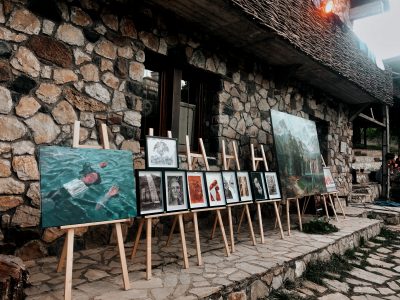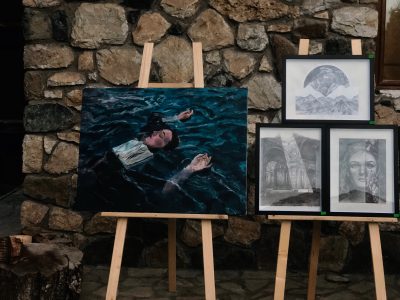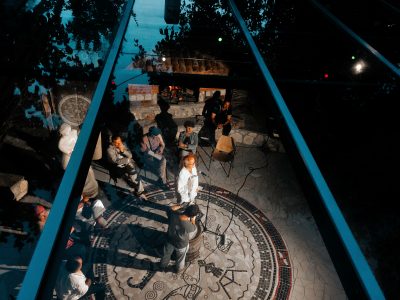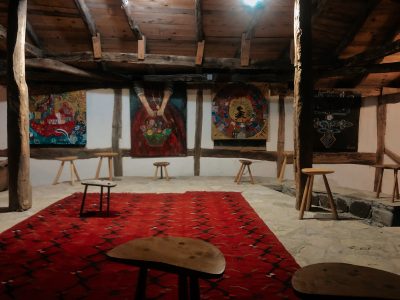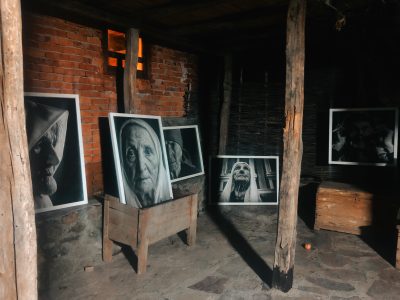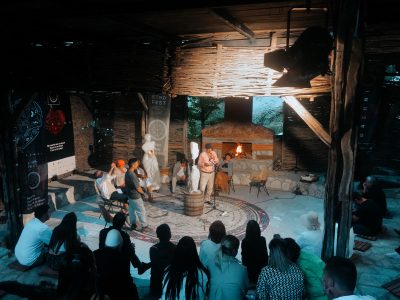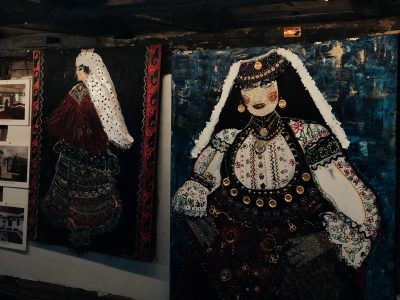In a house in the mountains, through the week-long EtnoFest festival, verses were woven, songs sung and plays and ballets performed in the name of love.
Accompanied by the hymn-verse of Ilaz Hysaj’s poem, “Me dashtë don me thane, zanin me ta dhanë, e me tu ba kangë” [To love it means to give thee my voice, for it a song to become], the Festival of Traditional Arts and Culture, EtnoFest, was held in the mountains for the twelfth time.
For eight days, exhibitions of well-known Albanian painters were displayed on the old walls of the festival house, contemporary plays and ballets were performed in the open air and literary classes were held by poets from different regions.
At the entrance to the complex, the works of the popular artist Hasan Ndreca and wooden mosaics by Nagip Tashi were exhibited, and folk ensembles performed.
Festival nights ended with music from well-known groups and singers, such as Edona Reshitaj, Frederik Ndoci, Gillespie and Semira Latifi.
In one form or another, each activity expressed a type of love, be it for oneself, romantic or social love, love for the homeland, or for the existence of the earth.
On the fourth night, the theme of love was described by the book of the actress Vlora Nikçi, “Popular erotic songs”.
EtnoFest founder Fadil Hysaj said that Nikçi was deserving of praise for highlighting these songs, “for such a gem that somehow we have not dared to sing those songs, because it was shameful”.
“These (erotic songs) didn’t come to Vlora, she collected them and put them together in an excellent book made with a luxurious design, which deserves to be kept in the library, in the most deserving place, where love deserves it,” Hysaj recalled.
Nikçi said that she has been amazed to hear these love songs, which are full of erotica, from her grandparents.
“In our heritage, we have so many erotic songs, so much love, so many sang about love back then. Why should we be ashamed? But what is better than knowing ourselves, and when we know ourselves, then the reasons remain for hiding it all. I was lucky because my grandparents sang erotic songs; when they saw that I fell in love, they sang erotic songs to me,” said Nikçi.
On one of the nights of the festival, the Minister of Culture, Hajrulla Çeku said that such a festival should be preserved and be a model for future generations.
“This organization is not a week of cultural activities, but a model that professor Fadil Hysaj built and which he started with a vision of leaving it to future generations as a space for heritage and culture,” Çeku said at the festival, referring to Hysaj.
Meanwhile, the mayor of Prishtina, Përparim Rama, said that this festival was different from other festivals because while it extends its hands to the modern, its “legs” are firmly embedded in the traditional.
“Completely different from other festivals that gather the public in closed urban halls, this festival brings the entire public out of the concrete jungle… [to] the green environment, under the open sky,” he said.
For 12 years, EtnoFest has been organized every year under the open skies in the village of Kukaj on the outskirts of Prishtina.
At the beginning of the festival it was a village almost without inhabitants, with only one resident family. The organization of festival activities aimed at preserving the culture of different Albanian regions transformed it into a cultural hub.
Hysaj said that the establishment of this festival in an abandoned village should remind people that they have abandoned the purest part of themselves.
“What we have created in Kukaj, I consider can be used as a model to bring life back to the abandoned areas of Kosovo, and I discovered that there are many things that we have abandoned, and when we abandon them, we abandon the most sublime part of us,” he added.
The festival of culture and arts will end on Friday.






